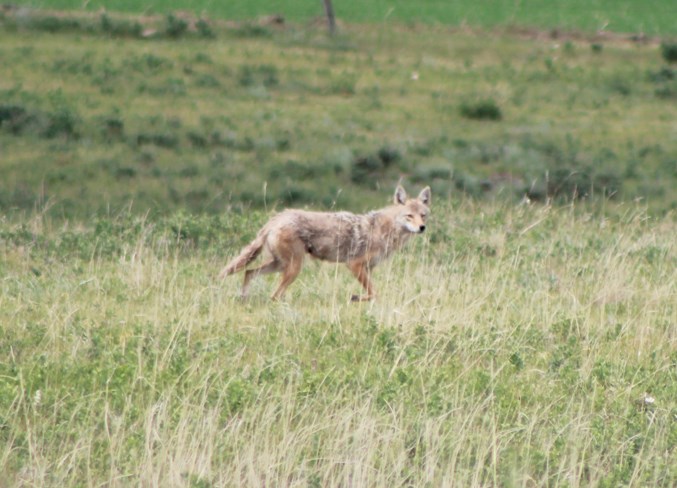Rural residents will have an opportunity to learn all about coexisting with coyotes at a workshop hosted by Rocky View County (RVC) from 6 to 8 p.m. May 2 at the Springbank Park for All Seasons.
Dr. Shelley Alexander, a coyote expert and professor in the University of Calgary’s department of geography, will present her research on coyote behaviour, biology and diet at the event, which will also highlight strategies for mitigating conflicts between humans and coyotes.
“Many people see coyotes regularly, and they really don’t have any issue with them,” she said.
Alexander has conducted a variety of research on local coyote behaviour. One study, over a 10-year period beginning around 2006, looked at coyote within Calgary and examined how diet can lead to conflicts with humans.
“We did find in areas where there were higher levels of garbage or human food being consumed in Calgary, there were higher levels of reporting of negative encounters,” she said. “That reinforced that idea that there is a connection between food conditioning and conflict.”
Alexander will also present findings from a content analysis of media reports on coyote attacks in Canada she undertook over a 12-year period. According to her findings, there is a strong relation between coyote attacks and diet.
“When I trace the story through time in the media, I found that in 100 per cent of the cases they were related to deliberate feeding,” she said. “They would either find out that people had been leaving out food in the neighbourhood, or they had killed the coyote and found human food in it – they were eating garbage or being deliberately feed.”
Alexander said this further points to food conditioning being a main factor in conflicts between humans and coyotes.
For this reason, she said, a key way to limit coyote interactions is limiting attractants – whether food or garbage – that may draw the animals to your property.
Alexander said another way to limit coyote attacks is to pay special attention to what dogs are doing. Often, coyote attacks on other animals come as a result of dogs running free off-leash.
“The best mitigation is to keep your dog on a leash if you notice coyotes around,” she said.
While keeping dogs secure on your property and limiting potential food sources for coyotes are the best ways to avoid problems, Alexander said it can be challenging to keep coyotes away completely. She said one of the best things residents can do is pay attention to behaviour patterns.
“When there’s something different happening, then you take a look at it and say, ‘Why is that? Why is that coyote in my yard, or why is it frequenting this area?’” she said. “It may not actually be something in your yard, it may be in a neighbour’s yard.”
Alexander said coexisting with coyotes is not just an individual effort – communities need to work together to curb negative interactions.
“It may not be just what’s on your property, it may be how your community is itself is handling garbage, or what other attractants might be there,” she said.
The upcoming workshop is limited to 50 spots, and residents can register online at rockyview.ca or by calling 403-230-1401.



